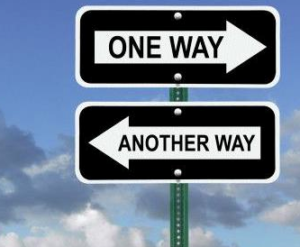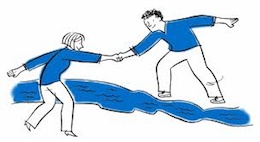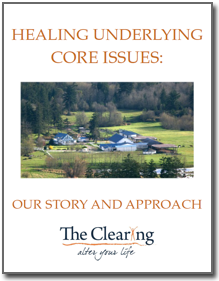Why do I keep feeling this way? Why can’t I get over it already? Why can’t I make the changes stick? I’m worried that I’ll start using ... again.
 If you’ve ever had these thoughts flash across your mind, then you’re familiar with the struggle to sustain positive behavioral change through addiction recovery. You may believe that you need more willpower or personal strength in order to stay clean and sober.
If you’ve ever had these thoughts flash across your mind, then you’re familiar with the struggle to sustain positive behavioral change through addiction recovery. You may believe that you need more willpower or personal strength in order to stay clean and sober.
But what if the problem isn’t your personal determination at all? What if your prior efforts to heal didn’t work because you only learned a handful of coping skills for addiction when what you really needed was therapy to address the underlying issues driving your behavior?
This article will clarify the difference between therapy and coping skills, discuss their roles in traditional addiction recovery programs, and explore how a more integrative approach can promote lasting recovery.
What are Coping Skills for Addiction?
Coping skills for addiction are the techniques we use to handle life’s challenges and navigate difficult situations.
Though the term tends to have a negative connotation, the reality is that coping skills - or broadly speaking, behavior modification skills - are a necessary part of life.
 For example, if you’re trying to stop drinking, it makes sense to avoid your favorite pub by taking a different route home from work!
For example, if you’re trying to stop drinking, it makes sense to avoid your favorite pub by taking a different route home from work!
This is a positive coping strategy.
There are many good mental health and behavioral change strategies, including:
- Meditation
- Exercise
- Relaxation, and
- Self-care
That said, problems arise when people suffering from addiction take a solely coping-skills-based approach to more complex problems. In colloquial terms, they put a Band-Aid on a bullet hole and say, “All fixed!”
For example, people often employ negative coping skills in times of extreme stress. They may use drugs and alcohol, or self-harm, or work to exhaustion.
These negative coping skills represent attempts to manage pain without addressing the real root cause of the suffering.
What is Addiction Therapy?
 Addiction therapy involves sessions with a trained therapist who treats mental and emotional health issues. There are many different therapeutic approaches - also known as treatment modalities -and no one modality resolves every addiction issue.
Addiction therapy involves sessions with a trained therapist who treats mental and emotional health issues. There are many different therapeutic approaches - also known as treatment modalities -and no one modality resolves every addiction issue.
Different modalities work best for different issues, be they physical, mental, emotional, or spiritual. There’s no one magic bullet approach that fixes everything; on the contrary, the most effective treatment integrates several approaches in a holistic, personalized manner.
12-Step Programs and Approach to Recovery
At present, most addiction rehab programs employ a 12 Steps approach. However, since therapy is not part of the 12 Steps tradition, many people don’t receive the individualized treatment they need for addiction recovery.
To be sure, Alcoholics Anonymous and other 12 Step groups have created a culture of steps, rituals, slogans, meetings, and sponsorship that do help some people to replace their dysfunctional habits with positive ones. Many people have attained sobriety and sanity this way. Those who can make it work have become beacons of light for their peers.
However, many other people struggle with this approach. They go to 12 Step programs because they are accessible, familiar, and popular.
Yet many report that they don’t feel heard and that the moralizing lectures and repetitive meetings aren’t helpful.
Addiction Therapy: The Missing Piece in Residential Rehab
The 12 Steps were developed as a grassroots program, and in this capacity they’ve helped millions of people find community and sobriety. However, 12 Step programs were never intended to be an alternative to addiction therapy.
As such, the amount of counseling that participants receive in 12 Step-based residential rehab varies tremendously. While some 12 Step-based rehab centers do provide significant time in therapy, many others do not. Instead, they rely on daily 12 Step meetings led by laypeople.
For some, this is sufficient to effect change. Yet others are left feeling as though they’ve failed because they weren’t able to “work the program". But what if the real problem was that the program didn’t provide support for their mental health issues?
Even the 12 Step programs that do offer a professional addiction counseling tend to rely on behavior modification and coping skills alone. However, this is an incomplete approach because it doesn’t address the core mental and emotional issues present.
Dual Diagnosis and Addiction
Research shows that most people who struggle with addiction are also dealing with a mental health condition, such as depression, anxiety, or post-traumatic stress disorder. The technical term for this is dual diagnosis.
According to the National Alliance on Mental Illness (NAMI), “Among the 20.2 million adults in the US who experienced a substance use disorder, 50.5%—10.2 million adults—had a co-occurring mental illness.”
Proper treatment for mental illness involves professional therapy, not just coping skills. At the end of the day, the question is, Do you want to cope with your issues or heal them?
Combining Coping Skills for Addiction and Therapy
 Dual diagnosis treatment isn’t about choosing between coping skills and therapy. Rather, it’s about combining the strengths of addiction coping skills and therapy to promote recovery. It’s about using a holistic model of healing, one that integrates all four levels of self:
Dual diagnosis treatment isn’t about choosing between coping skills and therapy. Rather, it’s about combining the strengths of addiction coping skills and therapy to promote recovery. It’s about using a holistic model of healing, one that integrates all four levels of self:
- The physical level (what we do)
- The mental level (what we think and believe)
- The emotional level (what we feel)
- The spiritual level (who we really are)
In true dual diagnosis addiction treatment, trained clinicians use evidence-based tools and approaches to empower people to both encounter and heal their emotional wounds.
Emotional wounds are like physical ones in that if you open up a wound, it is important to know how to close it back up properly! Trained therapists can help individuals to close those inner wounds with love, compassion, and expertise.
In the process, people tap into the power within them and redirect it for good.
They learn to stop abusing themselves and begin to make self-honoring choices.
They start to counsel themselves and work through the issues that arise when they return to their normal lives.
Next Steps in Addiction Recovery
We've created a unique addiction recovery program that combines coping skills, therapy, and hard work to get to the underlying core issues. We’ve seen how this powerful approach promotes lasting healing.
If you'd like to learn more or just have questions, contact us, or download our free eBook:




